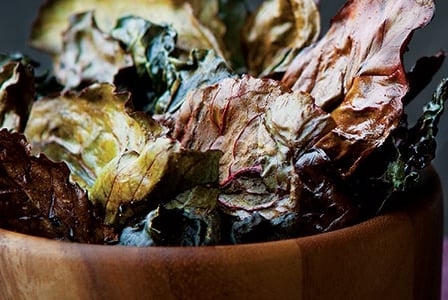
Winter greens such as Swiss chard, kale, or escarole are nutritional superstars. They add vitamin K and a host of other nutrients to these recipes.
Whether it’s taking public transit to work, fixing a leaky faucet, or composting your dinner scraps, it’s important to be green. The same holds true for your diet. While summer is all about refreshing salads bursting with farm-fresh lettuce, baby spinach, and arugula, winter presents the perfect opportunity to embrace hearty winter greens.
Swiss chard, jaunty kale, or peppery escarole: each of these leafy winter greens delivers distinct flavour profiles and can play a starring role in a range of dishes that go well beyond the salad bowl. Best of all, these leafy gems have a nutritional profile that makes other vegetables green with envy.
Health Canada recommends we eat at least one serving of a dark green vegetable daily. There’s no better place to start than with leafy winter greens. For the most part, these nutritional overachievers are saturated in an alphabet of nutrients and antioxidants. Kale, for example, is among nature’s best sources of vitamin K. As well as playing a key role in blood clotting, vitamin K aids in building strong bones.
Swiss chard and other greens are considered excellent sources of the carotenoids lutein and zeaxanthin, potent antioxidants shown to help bolster eye health.
And here’s more incentive to load up your grocery cart and dinner plate with these green giants: eating one and a half extra daily servings of leafy green vegetables may lower your risk of type 2 diabetes by 14 percent, according to a 2010 study in the British Medical Journal. This season, here’s how to celebrate the beauty of winter greens.
Recipes
- Curry Swiss Chard Chips
- Quinoa Kale Dinner Cake
- Pickled Chard Stems
- Mustard Green Shrimp Stir-Fry
- Sweet Potato Hummus Collard Wraps
- Escarole White Bean Soup with Turkey Meatballs
- Green Giant Smoothie
Green thumb
Follow these shopping and prep tips to get the most out of your winter greens.
Buying power
When purchasing winter greens, look for bunches that have lively-looking leaves and stems. Avoid any that are beginning to yellow.
Divide and conquer
The centre rib of winter greens such as chard and kale require extra cooking to become tender, so they’re best separated from the leaves. Use the tip of a chef’s knife to cut along the rib.
“Roll” play
An easy way to chop a bunch of winter greens is to stack the leaves, roll them up, and then slice them into whatever size you like.
Rub away
Mellowing out raw bitter greens such as kale and mustard greens is as simple as giving them a good massage. Squeezing the greens releases enzymes that reduce their bitter-tasting compounds. With clean hands, firmly massage the greens with your dressing of choice for 1 minute, or until tender.
Full steam ahead
To maintain the best texture, flavour, and colour, steam or quickly sauté winter greens rather than boil them.







